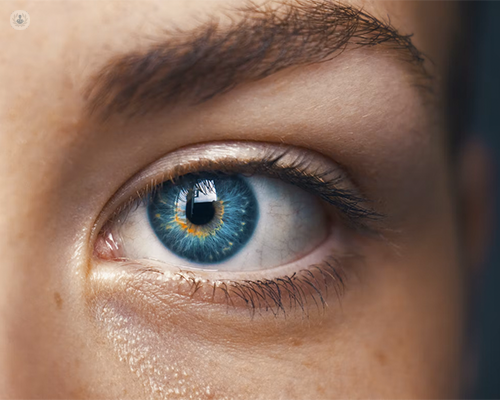A 'silent thief of sight': glaucoma's risk factors and treatment assessed
Written by:Glaucoma is an eye-affecting condition that leads to an eventual loss of nerve fibres in the optic nerve, and may not actually cause any symptoms in its early stages.
In one of today’s articles, revered London-based consultant ophthalmologist, Mr John Brookes, provides us with a comprehensive overview of glaucoma, including the main associated risk factors, and how it is diagnosed.

What is glaucoma?
Glaucoma is a disease of the optic nerve, interfering with the transmission of light entering the eye to the brain (occipital cortex), where images are ultimately interpreted. There are many types of glaucoma, but the common theme is the characteristic damage that occurs to the optic nerve, as well as the typical changes that cause damage to the field of vision.
What are the main associated risk factors?
Glaucoma can occur at any age, but increasing age is the most common risk factor for the development of glaucoma. Elevated eye pressure (intraocular pressure, IOP) is often associated with glaucoma, but glaucoma can be diagnosed even when the IOP is within the normal range (approximately 10-21mmHg).
What are the main symptoms?
Glaucoma is a chronic but slowly progressive disease, and as a result, there may be no symptoms of the disease in its early stages. Vision loss may only become apparent when a significant amount of damage has occurred to the optic nerve. It is therefore sometimes known as the ‘silent thief of sight’.
How is glaucoma diagnosed?
Most commonly, glaucoma is suspected by the optometrist or ophthalmologist during a sight test, or screening of people who may have a family history of glaucoma. If a first-degree relative has glaucoma (such as a parent, or sibling), it substantially increases a patient's risk of developing glaucoma, so all family members should be screened annually by their local optometrist or ophthalmologist.
What are the most effective treatments available?
Although glaucoma cannot be cured, there are many effective treatments, all of which, at present, rely on lowering the intraocular pressure. Upon diagnosis, most people will be offered treatment eye drops, or a laser treatment (SLT).
Rarely, if glaucoma is diagnosed when it is already at an advanced stage, surgery might be offered as the first-line treatment. Eye drops are the most common first-line option, though, and, in most cases, are prescribed in a once-daily preparation. Unfortunately, all treatments for glaucoma are lifelong, but maintaining the eye pressure at a certain level (‘target pressure’) will stabilise the glaucoma. If any deterioration continues, this will be at a much lower rate, and we would expect that, in the majority of cases, vision will be preserved for a patient’s lifespan.
Mr John Brookes is a highly qualified and trusted consultant ophthalmologist who can suggest the appropriate treatment option for your glaucoma. If you are suffering from the condition and are seeking professional medical help, make sure you visit Mr Brooke’s Top Doctors profile today to book a consultation with him.


